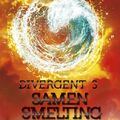- Home
- Entertainment
- Chickstyle
- Veronica Roth deelt alternatieve scènes tussen Cyra en Akos uit Carve The Mark

Het is alweer een tijdje geleden dat The Fates Divide, het slot van de Carve The Mark duologie, is verschenen! Het avontuur van Cyra en Akos kwam tot een einde in een sidderende finale. De scènes tussen hen waren fantastisch. Maar Veronica Roth heeft sommige scènes meerdere keren geschreven en nu heeft ze deze alternatieve scènes tussen Cyra en Akos eindelijk met haar fans gedeeld.
Op Goodreads vertelt Veronica Roth meer over Cyra en Akos en dat ze tijdens het schrijven langzaam van hen is gaan houden. Cyra is volgens haar een heldin. Ze is hard, meedogenloos en dapper, ondanks haar constante pijn. Ze probeert aardig te zijn in een wereld die je alleen maar beloont met wreedheid. En het lot van Akos is hem niet gunstig gezind. Hij zal doodgaan terwijl hij zijn gezworen vijand dient. Zijn psychische kracht isoleert hem, maar geeft hem ook de kracht om Cyra te helpen. Zijn aanraking is letterlijk het enige dat haar kan verlossen van de pijn.
De relatie tussen Cyra en Akos is volgens Veronica Roth erg moeilijk. Ze staan soms op kruispunten die zowel uitdagend als passioneel zijn. Het is erg intens. De twee alternatieve scènes tussen Cyra en Akos (hun eerste ontmoeting en eerste kus) hebben het boek uiteindelijk niet gehaald, maar laten duidelijk zien waarom Veronica Roth de liefde tussen Cyra en Akos zo geweldig vindt: “Haar onwrikbare wreedheid. Zijn stille intensiteit. Hun gedeelde behoefte.”
Hieronder vindt je de twee scènes die Carve The Mark helaas niet hebben gehaald. Let op! De scènes tussen Cyra en Akos zijn in het Engels geschreven:
Cyra Meets Akos - early draft
I marched through the foyer toward the training room, my skin stained with tar-black tendrils. The guards milling around (a sign of Ryzek’s presence in the house—where he was, guards were also) all pulled away from me, creating a clear path. They were grown men and women with armor and currentblades and years of military training, yet they recoiled from even the possibility of contact with my skin. (Cowards.)
Their shoes had marked the polished floors with dusty footprints from the streets outside, and though they wore uniforms of dark armor, I saw faint distinctions among them, a blue tassel hanging here, an embroidered emblem on a collar there, buttons covered in bright foil so they shone, scavenged fasteners from Othyr that glittered like gems. They were gathered around the screen on the close wall to watch the news feed, which now blared in Zoldan with Shotet subtitles, and showed something about famine on the galaxy’s fringe.
Our people had always been suspicious of outsiders, because they had preyed on us when we were just wanderers, not warriors. My father had taken advantage of that suspicion, prohibiting the teaching of other languages in classrooms, citing a desire to preserve Shotet purity. But when the fates were released to the public, when I was young, he had still released countless reports about the Assembly and its falsehood, explaining that we would no longer subject our people to its lies about my father’s successor—just in case the older ones, the ones who were still multilingual, were listening and repeating. Ryzek had taken my father’s measures a step farther, introducing the control of information through “creative translation” (more often, outright lies) in feed subtitles. Most of the people (and there were few) who knew how different the Shotet characters were from the words actually being said on the news feed were already in Ryzek’s service, favored and high-ranking. Information, Ryzek said, was powerful. It should be measured carefully. (My books on military strategy agreed.)
The training room, down the hall from my bedroom, was bright and spacious, a wall of windows on one side, a wall of mirrors on the other. A gilded chandelier dangled from the ceiling, its delicate beauty contrasting with the black synthetic floor and the stacks of pads and practice weapons along the far wall. It was the only room in the house my mother had allowed to be modernized; she had otherwise insisted on preserving the house’s “historical integrity,” down to the pipes that sometimes smelled like rot and the tarnished doorknobs. Ryzek in particular encouraged her to allow the training room to be built; he always wanted me to become a stronger fighter, convinced that the more deadly I was, the more fear I could provoke on his behalf—to the Shotet, I was just an extension of Ryzek’s power.
Luckily, I liked to practice—not because it made me a stronger fighter, though that was a welcome side benefit, but because I liked how it felt. The heat building, the pounding heart, the productive ache of tired muscles. The pain I chose, instead of the pain that had chosen me.
I once tried to spar against the training soldiers, like Ryzek had as he was learning, but the current’s ink, coursing through every part of my body, caused them too much pain, so after that there were holographic figures in my training room, programmed with different strengths and weaknesses and weapons.
After I warmed up, I turned on my holographic opponent, and attached the simulator to the back of my neck. I winced as I felt the painful squeeze; it was sending fine tendrils into my body to wrap around my spine. They would burrow harmlessly down to my spinal cord, and send signals to imitate the pain of an actual fight.
The hologram flickered into being in the middle of the floor, which was made of a synthetic material taken from the planet Pitha, springy enough to protect my joints but durable enough to protect the equipment beneath it that produced the image.
This hologram was a slight, quick woman made of orange light (my height, designed to mimic me). I bounced on my toes. She wouldn’t move until I was close to her bright form, so I had some time to form my strategy. I had been reading Shotet texts about our long-forgotten form of combat, the school of the mind. Elmetahak. Like so many things in our culture, it was scavenged, taking some of Ogran ferocity and Othyrian logic and our own resourcefulness and melding them until they were inextricable.
Today the words sounding in my head were: once the fighter has deemed the physical conflict both necessary and unavoidable, she must ask herself, not “what am I able to do?” but rather “what is my opponent able to do?” And the answer was easy: my opponent was a computer generated image, programmed to mimic experiences of pain and injury. She would be consistent, but predictable, incapable of moments of true revelation.
I approached her, and she lurched into motion, swinging a fist at my head. I was caught off-guard; the blow landed on my cheek, and the simulator sent a jolt of pain down my spine. I winced, and backed up.
She advanced, fast, and this time I was ready; I spun away from her first kick, and blocked her next punch with my forearm. Then I ran at her, high-kicking at her head (dodged), punching her stomach (successful, but not enough to disable her), and sweep-kicking her knees (useless).
Pummeling different body parts clearly wasn’t working; I straightened, and punched her, fast, again and again, forcing her to focus on blocking instead of footwork. Then I drove my knee into her gut, and she stumbled back, hunched over.
I bent and charged toward her, ramming my shoulder into her chest. We both fell, and when she was flat on her back, I put my knee against her throat, my arm up to block her kicks, which flailed wildly in my direction. After a few seconds she stopped struggling, and the light faded into the floor.
Someone was clapping for me, slowly, from the doorway. Ryzek, his spindly body barely fitting in the door frame. Vas slouched in the hallway behind him. And standing between them, right under the light fixture that cast shifting light over the dark floorboards, was someone I recognized distantly, as if from a dream.
He was tall. He stood like a soldier, straight-backed, like he knew the boundaries of his body and how to move it. Despite that soldiers’ posture, he was thin (gaunt, really, little shadows pooling under his cheekbones), and his face was dappled with bruises and cuts (again?). There was a white bandage wrapped around his right arm—a fresh kill mark, if I had to guess, still healing.
He lifted his eyes to mine (dark gray). It was their wariness—his wariness—that made me remember who he was. Akos Kereseth, third son of the fourth family, now almost a grown man.
All the pain that had been building in my head came rushing back at once, and I seized my head with both hands, stifling a cry. I could hardly see my brother through the haze of tears, but I tried to focus on his face (pale like a corpse).
“Particularly bad today,” I said, through gritted teeth.
“I am glad you were in here for that display,” Ryzek replied. “We can’t have my soldiers knowing how weak you are.”
I absorbed the insult like I was absorbing the agony, coaxing my muscles into relaxing, surrendering to pain.
There were rumors about me all throughout Shotet and Thuvhe, encouraged by Ryzek—maybe those rumors had traveled all throughout the galaxy, since all mouths loved to chatter about the favored lines. They spoke of me killing a man with a touch, of the agony my hands could bring, of an arm littered with kill marks from wrist to shoulder and back again. I was feared and loathed and respected, all at once. But this version of me—this collapsing, whimpering girl who needed to be held up to stay standing—was not that person of rumor. (No one could know.)
“You did well against that hologram,” he added. “We will have to increase its difficulty.”
“I welcome the challenge,” I said, dragging my hands down my face. I tried to straighten, but my very bones ached.
“Let’s not delay this,” Ryzek said, and he beckoned to Akos (wide-eyed now) to follow him into the room. They both drew closer, Akos’s right arm pulled close to his body, like he was trying to stay as far away from Ryzek as possible without disobeying him. Vas followed them in, lurking like a shadow.
“This is Akos Kereseth,” Ryzek said to me, gesturing to the boy. “Third child of the fourth family.”
I heard his fate immediately after his name, like two lines in a childhood rhyme. The third child of the fourth family will die in service to the second family.
“Our faithful servant,” Ryzek added, with a smirk. Judging by the sour twist of Akos’s mouth, he was anything but. Still, I knew how this worked: Eijeh was still our prisoner, and that meant Akos would obey to keep his brother safe.
I had seen Eijeh only once since his arrival. It had been in passing, in a corridor near Ryzek’s office. He had been half-starved, bloodied, dead in the eyes. As Vas muscled him past me, I stared at the hollows above his collarbone, deep trenches now empty of flesh. Either Eijeh Kereseth had an iron will, or he really didn’t know how to wield his currentgift (if I had to bet on one or the other, it would be the latter).
“Akos has a peculiar currentgift that I think you might be interested in, Cyra,” Ryzek said. (Again with that mischief.)
He nodded to Akos, who moved closer to me, and then extended his hand, palm up, for me to take.
I stared at it.
“Take his hand,” Vas whispered. “Trust me, you’ll like it.”
I shuddered at the feeling of his breaths against my neck. Vas couldn’t feel pain, which meant he was the only person I had ever encountered who could touch me with bare hands, and he liked to make sure I knew it. When you get older, he liked to say to me, when Ryzek couldn’t hear him, you may see value in my touch, little Cyra. And I always told him I would rather die alone. It was true.
As I reached for Akos, the darkness spread beneath my skin like spilled ink. I touched my hand to his, and waited for him to scream.
Instead, all the currentshadows ran backward and disappeared. And with them went my pain.
I had been in constant pain since I was eight. Diluted hushflower made it easier to bear, and stronger potions made me sleep, but there was no getting rid of it, no matter how many remedies my mother had tried. Nothing had helped…except this. Except Akos’s hand.
(His skin was rough and dry, like a pebble not yet smoothed by the tide. Yet there was some warmth in it.)
I planted my feet, staring at our joined hands and then at him, at his gray eyes (so tired).
“What is this?” I said to him.
“I interrupt the current.” His voice was surprisingly deep, for someone his age, but it crackled like it was supposed to. “No matter what it does.”
“My sister’s gift is substantial, Kereseth,” Ryzek said. “But it incapacitates her, keeps her from being as useful as she could be. It seems to me that this pairing is exactly how you can best fulfill your fate.” He stood behind Akos and bent close to his ear. “But remember…who really runs this house.”
Akos didn’t move.
I had heard the story of Akos’s capture, his father’s death; how they had dragged him screaming across the Mad Plains; how he had disabled the handcuffs with his current-deadening fingers, stolen Kalmev Radix’s blade, and killed him with it, earning his first mark before he even crossed the Divide. But it hadn’t seemed real until he was standing in front of me. That he had killed. (That he had suffered loss.)
“What are we supposed to do, hold hands everywhere we go?” I said. “What will people think?”
“They will think he is a servant,” Ryzek said, “because that is all that you will show them.” Ryzek stepped toward me, lifting his hand to touch me. I recoiled, yanking my hand from Akos’s grasp and flushing with black tendrils all over again. Ryzek lowered his hand.
“Do I detect ingratitude?” Ryzek said. “Do you not appreciate the efforts I have made to ensure your comfort, what I am giving up by offering you our fated servant as a constant companion?”
“I do,” I said, quietly. I had to be careful. Ryzek could touch me now—all he had to do was have Akos touch me first. The last thing I wanted was more of Ryzek’s memories replacing my own. “Thank you, Ryzek.”
“Of course.” Ryzek straightened, and smiled. “Anything to keep my best general in prime condition.”
But he didn’t think of me as a general; I knew that. The soldiers called me “Ryzek’s Scourge,” the instrument of torment in his hand, and indeed, the way he looked at me was the same way he looked at an impressive weapon. I was just a blade to him.
I held the pain in like it was a sneeze until Ryzek and Vas left, and then, when Akos and I were alone, I let it come back. I braced myself against the wall with both hands, jaw clenched, trying hard not to scream.
“How long have you been living this way?” he asked me.
“What way?” I said.
“Like this, keeping your suffering a secret.”
“I came into my gift when I had only been through three sojourns. Seven seasons, I suppose you would say,” I said. “To the great delight of my esteemed father and brother. We all agreed that I would keep the painful aspects of my gift private, for the good of the family.” I paused. “For the good of Shotet.”
He snorted a little, and I wheeled around, shoving him hard against the wall. (I had to address small insults early, or they would grow more unwieldy, in time. My father had taught me that.)
“You will not disrespect me,” I said. “I may be in pain, but I am not weak. Your gift is convenient, but it is not necessary. Understand?”
He looked at my arm, where my sleeve had fallen away, showing the sheath of armor I wore around my left arm, from wrist to elbow. It, like the chest armor I had earned when I was young, was made from the skin of an Armored One, and it was scratched in places from the swipes of sharpened blades. I hardly ever took it off.
“You cover them,” he said. “Your kill marks.”
I pushed him harder into the wall.
“What, you’re not proud?” He smirked without humor. “Ryzek’s Scourge, sister of the man who murdered my father, doesn’t want to show off her brutality?”
I couldn’t hurt him with my gift, but that didn’t mean I couldn’t hurt him. I swung my arm, bringing the back of my hand hard against his face. (I regretted it immediately.)
“You know,” I said, breathless. “I didn’t choose the blood that runs in my veins.”
Then I pulled away, marched out of the room, and sprinted down the hallway to my bedroom. When I reached it, I paced back and forth in front of the fireplace, clutching my head. I didn’t want this; I didn’t want this at all.
Cyra and Akos’s First Kiss - early draft
In this scene, you'll see that Cyra's currentgift didn't always manifest as shadows--in early drafts, it was light that crawled over her skin, causing her pain. Ultimately I decided that the shadows were more interesting, given the revelation she has at the end of The Fates Divide about what they really are. But it was hard to let go of the image of Cyra Noavek glowing like a small sun!
“You okay?” I said.
He didn’t look back. “Not really.”
“She loves you,” I said. “Your mother, I mean.”
“Don’t say that to me right now.”
I nodded, though he couldn’t see me.
“Fine,” I said. “Then I say fuck them. Our parents are sadists and liars. Fuck them.”
He pulled his shirt over his head, and I stepped back, pushing the door closed behind me. He turned at the sound. I felt the lights burning in my cheeks like a blush as I looked over his narrow waist. The bruises that had stained his skin the last time I saw him, cowering on the floor in the basement, were faded now, light brown and green. He wore new scars on his left arm and a new weight on his shoulders, invisible to anyone but me. I knew what Akos Kereseth looked like when he was bearing a burden.
I pressed my hands to my cheeks, briefly, willing myself to calm down. “Dammit,” I said. “I’m sorry, I—”
But he was moving toward me—cautiously at first, one step at a time. Frowning, a crease between his eyebrows. The closer he came, the brighter and more frantic the lights became, until I had to bite my tongue so I wouldn’t cry out at the pain. A strange ferocity came into his eyes, and he pressed into the door, framing my face with his forearms. He was so close I could feel his warmth. He was so close I could taste his breaths. He was so close my entire body was bright.
I flinched, and at the first outward sign of my pain, he pressed a hand to my cheek, extinguishing the current lights so all I had left was the pulse in my face and my hands and the deep ache in my stomach, the ache that was just for him.
“Akos,” I said. “What are you—”
He dropped his hand to my waist, to the strip of skin between my pants and my shirt. Then he bent his head and kissed me.
For a moment I was too shocked to do anything but stand there, but then I put my hands on him. He pulled me closer, his arm wrapping around my back, his hand covering my side, beneath my shirt. Everything was warm and close and muddled for a moment, and then he pressed me against the door again, hard, his teeth closing over my lip. He kissed my throat, hungry and searching, and I cursed myself—loudly—as I pressed him away.
“Akos,” I said. “You’re not okay. This is just… proof.”
“I told you,” he said, speaking straight into my mouth. “Everything has changed. Everything changed when you sent me home.”
He kissed me again, lightly this time, and slowly.
Wat vind jij van deze alternatieve scènes tussen Cyra en Akos?
Bron: goodreads.com
Lees ook: Cassandra Clare's nieuwe Shadowhunters boek 'Chain of Gold' is onderweg
Nieuwste artikelen
-

De omzwervingen van Boek - Melanie van de Peut
-

Familiehuis aan zee - Simone Foekens
-

Net goed – Tjibbe Veldkamp
-

Zusje van mij - Mikaela Bley
-

Toen de maskers kwamen - Jennifer Dugan
Gerelateerde artikelen
-

Divergent Allegiant part 2 officieel stop gezet
-

De top 10 beste boekverfilmingen
-

Complete Young Adult series die je achter elkaar wil lezen
-

Recensie: Divergent 3 - Samensmelting
-

Recensie: Het verhaal van Four







